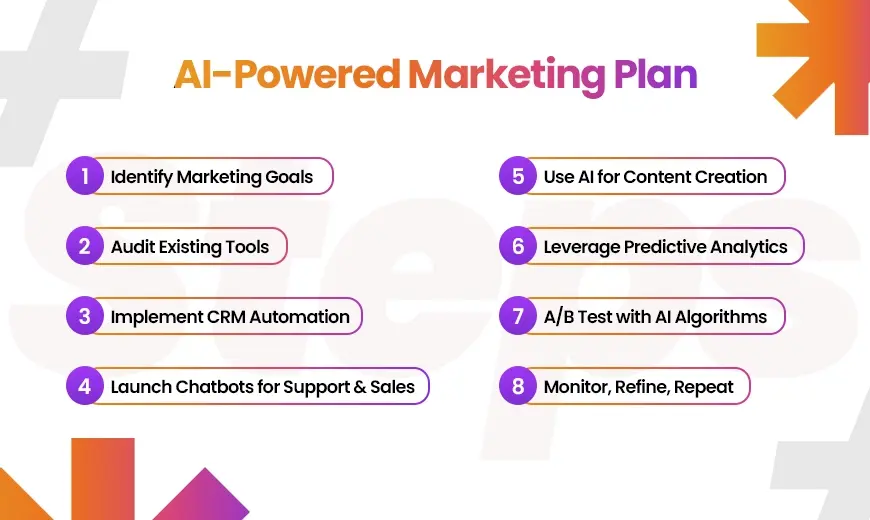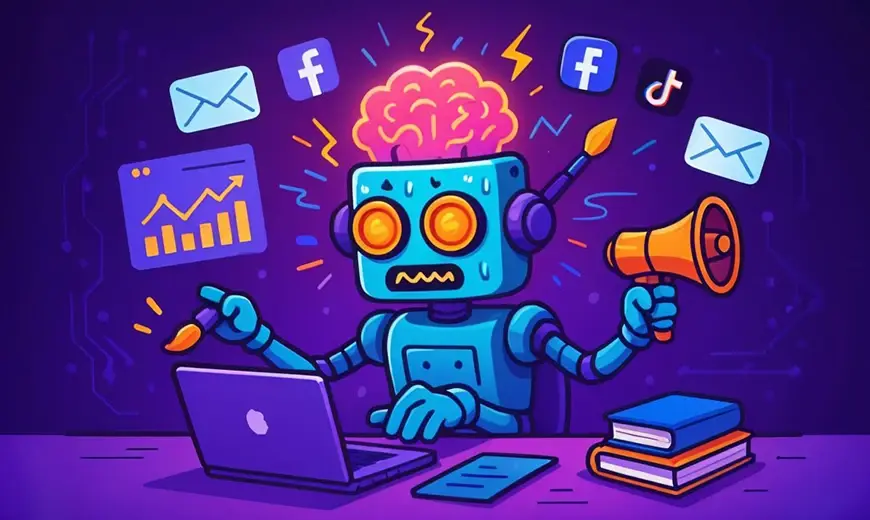Artificial Intelligence (AI) is no longer a futuristic concept—it's today’s reality. As we move deeper into 2025, AI-powered marketing is leading a massive transformation in how brands attract, engage, and retain customers. With the rise of automation and intelligent tools, digital strategies are evolving at an unprecedented pace. Businesses that fail to embrace this shift risk falling behind. So, what does this transformation look like?
Let’s explore how AI is redefining digital marketing and why your brand needs to catch up, fast.
Table of Contents
From Guesswork to Precision: The Rise of Predictive Analytics
Gone are the days when marketers relied on hunches and basic segmentation. With predictive analytics in marketing, brands now forecast customer behavior, predict trends, and allocate budgets with razor-sharp accuracy. AI crunches vast data sets to identify patterns, allowing marketers to act proactively rather than reactively. This shift from reactive to predictive strategies results in smarter campaigns and higher ROI.
Personalized Experiences with Machine Learning
In 2025, personalization with machine learning isn’t a competitive edge—it’s the standard. Consumers expect tailored content, offers, and experiences. AI algorithms analyze user preferences, browsing behavior, and purchase history to deliver hyper-relevant messaging. Whether it’s a product recommendation or a curated email, AI ensures every touchpoint resonates.
Smarter Engagement: Chatbots Take the Lead
Chatbots for customer engagement have evolved from basic scripted bots to sophisticated conversational agents. Powered by natural language processing (NLP), today’s chatbots can understand context, sentiment, and intent. They're available 24/7, offering instant support, resolving queries, and even upselling products. For businesses, this means lower support costs and improved customer satisfaction.
Efficiency Through Automation
Efficiency is the name of the game in 2025. Marketing automation trends 2025 show a strong shift towards streamlining repetitive tasks like email scheduling, social media posting, and campaign tracking. AI helps marketers automate workflows, freeing up time for creative strategy. Tools powered by CRM automation and automated lead nurturing guide prospects through the funnel without human intervention, boosting conversion rates effortlessly.
AI-Powered Content Creation
AI is no longer just a tool for analysis—it's stepping into the creative spotlight. With the help of artificial intelligence in content creation, brands can now generate blog posts, social media captions, ad copies, and even video scripts with remarkable speed and relevance. These tools use natural language generation (NLG) and data-driven insights to produce content that aligns with user intent and SEO goals. This doesn’t mean creatives are being replaced; instead, AI provides a strong starting point, enhances productivity, and ensures that content is tailored to audience behavior and market trends.
Voice Search and AI in SEO
As voice-activated devices become mainstream, AI is reshaping SEO strategies to focus on conversational search queries. Marketers now optimize content to align with how people speak, not just type. AI tools help identify long-tail voice search terms and structure content to answer natural-language questions effectively. This shift toward voice-friendly content ensures better visibility and engagement in voice-based search environments.
Data-Driven Marketing: The Core of It All
At the heart of this transformation is data-driven marketing. AI systems process vast volumes of customer data in real time, helping marketers make informed decisions. Whether it’s optimizing a campaign or spotting a new market trend, AI provides the insights needed to act quickly and strategically.
The Future of Digital Advertising
AI is rewriting the rules of advertising. From programmatic ad buying to real-time bidding, the future of digital advertising is heavily automated and insight-driven. Algorithms identify the best platforms, formats, and times to reach target audiences. This results in less waste, better targeting, and increased ROI. Simply put, AI ensures every advertising dollar works harder.
How to Begin Your Journey with AI-Powered Marketing
Integrating AI into your digital marketing doesn’t have to mean starting from scratch. Most businesses already have tools that can be enhanced with AI. Many email marketing platforms, CRM systems, and ad managers now offer AI-powered features or integrations. By gradually layering these smart tools onto your existing systems, you can enhance campaign performance without overhauling your entire tech stack.
To ensure a smooth transition into AI-powered marketing, consider partnering with professionals who understand the nuances of automation, personalization, and data-driven strategy. KDM Agency offers expert guidance and hands-on support to help you integrate AI into your digital workflows effectively. Whether you're looking to automate lead nurturing, enhance content creation, or leverage predictive analytics, our team can help tailor a solution that aligns with your business goals.
Book a FREE Consultation

Sample AI-Powered Marketing Plan
Here’s a simple step-by-step roadmap to help you begin implementing AI in your marketing strategy:
Step 1: Identify Marketing Goals
Clarify your objectives—brand awareness, lead generation, or customer retention. Your goals will shape the AI tools and strategies you implement.
Step 2: Audit Existing Tools
Evaluate your current CRM, email marketing, analytics, and advertising platforms. Identify where AI-powered features can be integrated or upgraded.
Step 3: Implement CRM Automation
Begin with automating customer data management, segmentation, and communication workflows. This saves time and enhances personalization.
Step 4: Launch Chatbots for Support & Sales
Deploy chatbots on your website or messaging platforms to answer FAQs, qualify leads, and provide instant support.
Step 5: Use AI for Content Creation
Adopt AI tools for generating blogs, social media content, or ad copies. Use data insights to optimize tone, timing, and relevance.
Step 6: Leverage Predictive Analytics
Apply AI to forecast campaign outcomes, customer behavior, and optimal engagement windows.
Step 7: A/B Test with AI Algorithms
Use AI to run and evaluate A/B tests on content, subject lines, and ads for data-driven decision-making.
Step 8: Monitor, Refine, Repeat
Track performance using AI analytics, refine strategies, and continue scaling AI adoption across all campaigns.
For a custom marketing plan tailored to your business, connect with the experts at KDM Agency.
FAQs
Q: What is AI-powered marketing?
A: AI enhances customer engagement through intelligent chatbots, personalized content, and timely responses that adapt to each customer’s behavior and preferences.
Q: What are examples of AI tools in marketing?
A: Popular tools include ChatGPT and Jasper for content generation, Mailchimp and HubSpot for AI-powered email marketing, Salesforce Einstein for predictive analytics, Drift and Intercom for chatbot automation, and Hootsuite Insights or Sprout Social for social listening and customer segmentation.
Q: Is AI replacing marketers?
A: No. AI complements marketers by automating routine tasks and providing insights. Human creativity and strategy remain crucial for successful marketing campaigns.
Q: How can a business start using AI in digital marketing?
A: Start with manageable steps like CRM automation, using chatbots for support, or testing AI-driven ad targeting tools. Choose tools that align with your goals and scale gradually.
Q: What industries benefit most from AI-powered marketing?
A: Virtually every industry can benefit from AI, but it's particularly impactful in e-commerce, finance, healthcare, real estate, and SaaS where data volumes are high and customer expectations for personalization are greater.
Q: Can small businesses afford AI-powered marketing?
A: Yes. Many AI tools are now accessible via affordable subscriptions or built into existing marketing platforms. Small businesses can start with basic automation and scale as they grow.
Q: How does AI support omnichannel marketing?
A: AI helps synchronize messages across channels by analyzing user behavior in real-time. This ensures consistency in messaging whether a customer interacts via social media, email, or website.
Q: Are there risks involved in AI marketing?
A: The primary risks include data privacy issues, algorithmic bias, and over-reliance on automation. It's important to choose ethical AI tools and retain human oversight.
Q: How do I measure the success of AI-powered marketing?
A: Track KPIs like customer engagement, conversion rates, campaign ROI, and cost per acquisition. AI analytics can also reveal deeper insights like sentiment trends and lifetime value.

